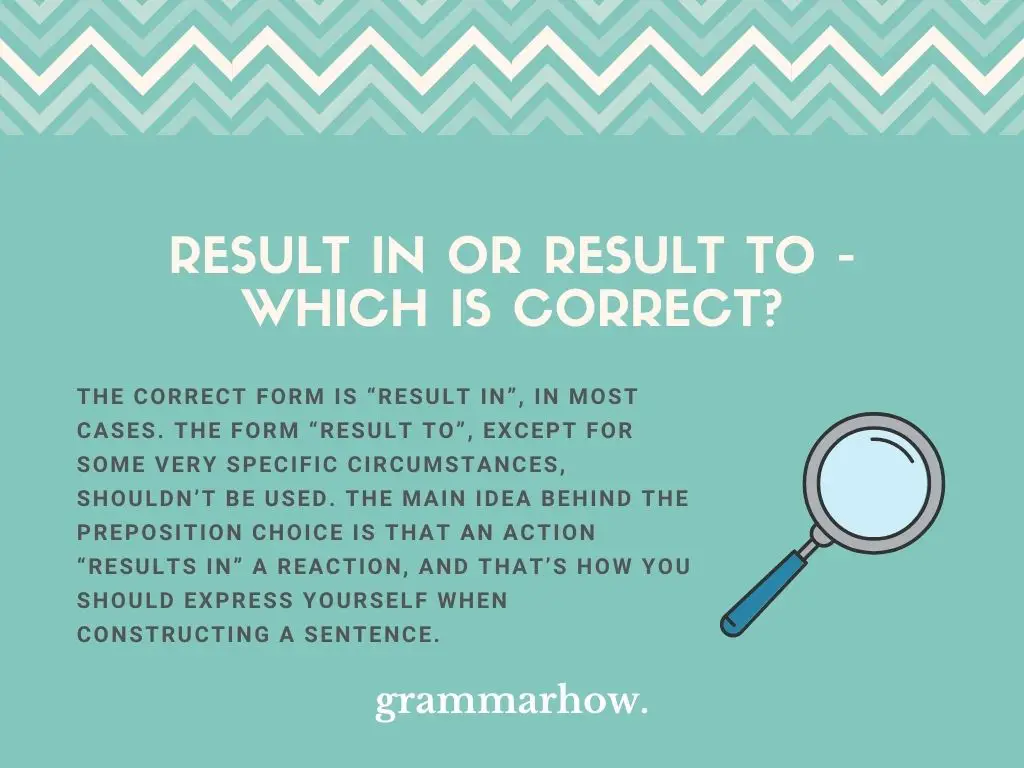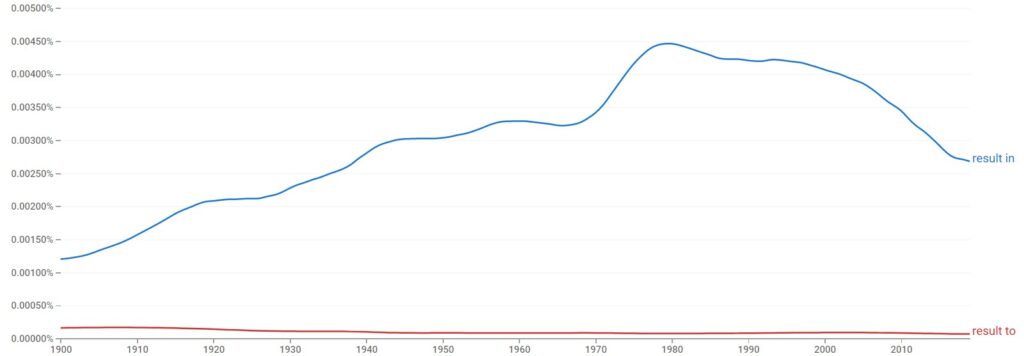Prepositions have the ability to completely change the meaning of an expression or sentence. In fact, a change in preposition can make a phrase grammatically wrong.
Is it the case here? Can we use “Result In” and “Result To” just the same? Or is one of them incorrect?
Result In or Result To – Which Is Correct?
The correct form is “Result In”, in most cases. The form “Result To”, except for some very specific circumstances, shouldn’t be used. The main idea behind the preposition choice is that an action “Results In” a reaction, and that’s how you should express yourself when constructing a sentence.

Before looking at each form, let’s see some examples:
- Mark knew that if he did anything, it would only result in tragedy.
- Mark knew that if he did anything, it would only result to tragedy. (incorrect)
If you read the sentences out loud, the second one even sounds strange! In this case, “Result In” and “Result To” don’t mean the same and “Result To” isn’t correct.
Result In
To “Result In” means that a certain action has a specific outcome or end. It’s an idiomatic expression, frequently used in the past tense, to refer to the consequences of actions that were taken prior. The idea behind it is simply that every action “Results In” a reaction.
Let’s see some examples of how to use “Result In” in a sentence:
- Cheating will result in detention and the cancellation of your score.
- The chemotherapy eventually resulted in his cancer going into remission.
- Mark wore the wrong color to the party, resulting in him standing out.
- Putting on moisturizer daily has resulted in Vanessa’s skin being much healthier.
- Derek’s lifelong smoking resulted in lung disease.
Every sentence has a clear action that leads to a reaction. The message is that the original action is connected to its consequence, and it makes no sense to describe them separately.
Usually, those are the cases where you’d use “Result In”: to illustrate that one thing led to another. In our sentences, cheating “Resulted In” detention, smoking “Resulted In” a disease, and so on.
Result To
“Result To” is wrong in cases where you refer to consequences to actions. The preposition “To”, used here, indicates movement. It relates to a thing going from one place to another. Therefore, it makes no sense to use it in connection to the idea of actions and its consequences.
Take a look at how “Result To” is wrong in a sentence:
- Ignoring his teacher all year long resulted to Ben failing his final exam. (incorrect)
- Ignoring his teacher all year long resulted in Ben failing his final exam.
- Leon’s outgoing nature resulted to people being drawn to him. (incorrect)
- Leon’s outgoing nature resulted in people being drawn to him.
- Fred forgot to take his medication, resulting to a lot of pain. (incorrect)
- Fred forgot to take his medication, resulting in a lot of pain.
“Result To” just doesn’t fit these sentences well, because “To” is the wrong preposition for those cases.
Whenever you feel tempted to use “Result To”, just change it to “Result In”. You’ll have a much better sentence, grammatically accurate and polished.
Which Is Used the Most?
You already know that “Result In” is the correct form. But do you think a lot of people still use “Result To”, even if it is incorrect? Let’s see the graph from Google Ngram Viewer below, to find out.

As you can see by the graph, the expression “Result To” is rarely used, when compared to “Result In”. We think it was expected, considering that “Result To” is incorrect.
Even if we consider that wrong forms are still used by some and it’ll appear in a graph like this, the difference makes it clear that “Result To” isn’t the form anyone should be using in those situations.
In fact, it’s another indication that “Result In” is the form that people should use more, in their daily lives.
Final Thoughts
Sometimes, expressions we hear around are plain wrong. They’re incorrect and should be avoided. This is the case with “Result To”: this form is incorrect. The correct choice, when discussing actions and consequences, is to use “Result In”, especially when reporting something in the past.

Martin holds a Master’s degree in Finance and International Business. He has six years of experience in professional communication with clients, executives, and colleagues. Furthermore, he has teaching experience from Aarhus University. Martin has been featured as an expert in communication and teaching on Forbes and Shopify. Read more about Martin here.
